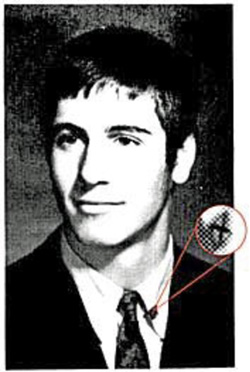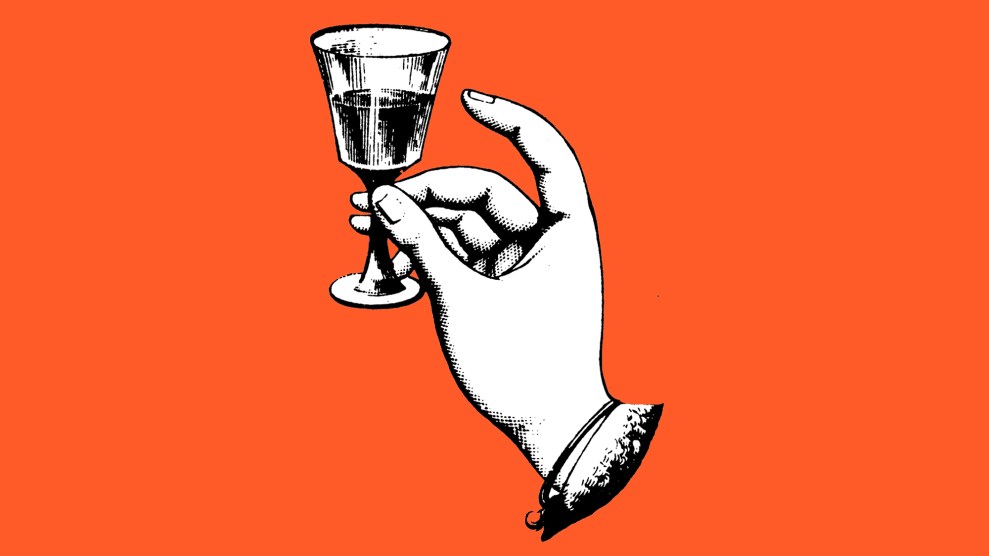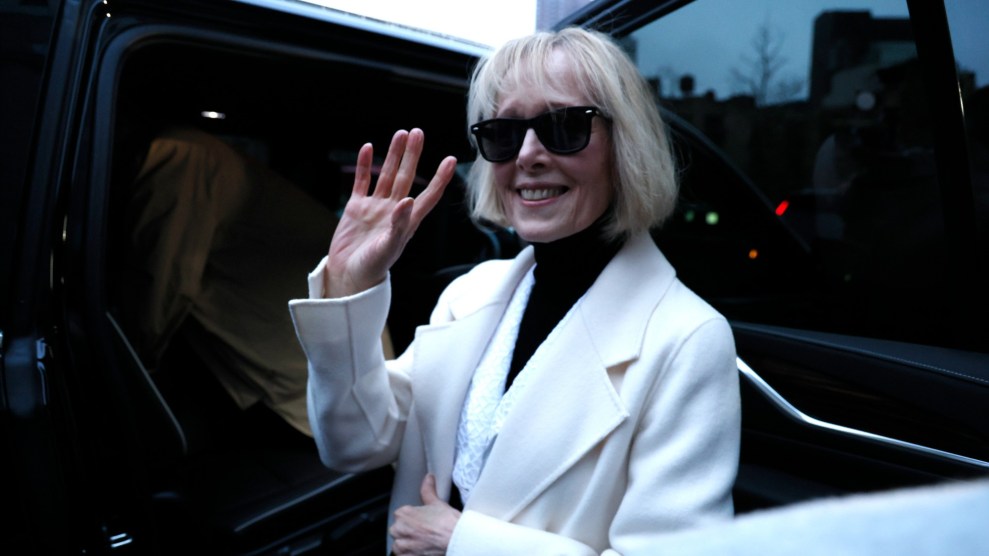 Illustration by Steve BrodnerUpdate, 6/12/12: George Allen has won today’s Republican primary for his old Virginia Senate seat. A recent poll found him to be running neck-and-neck with former Gov. Tim Kaine (D).
Illustration by Steve BrodnerUpdate, 6/12/12: George Allen has won today’s Republican primary for his old Virginia Senate seat. A recent poll found him to be running neck-and-neck with former Gov. Tim Kaine (D).
In the six years since he effectively ended his Senate career with the most famous viral video in political history, George “Macaca” Allen has learned one very important lesson: If you can’t watch what you say, watch whom you say it to.
Which is why, as the former Republican senator from Virginia makes a run for his old seat, he’s taking a few precautions. Opposition video trackers are shown the door whenever possible; reporters from magazines named after early-20th-century labor activists are brushed off. Appearances are limited to friendly venues like Washington and Lee University’s quadrennial mock Republican convention, where amid a sea of boat shoes, blazers, and swoop cuts, Allen’s good-old-boy shtick finds a receptive audience.
“He’s always kept politics in perspective through the use of sports metaphors,” the student introducing him explains. Sure enough, Allen, the author of What Washington Can Learn From the World of Sports and the son of a legendary Washington Redskins coach, peppers his stump speech with enthusiastic, sometimes pained athletic terminology. “Now, folks, all the sports teams here like talking about how ‘we’re No. 1,'” Allen tells the crowd. “Well, guess what? In energy, America is No. 1.”
The sports talk spills into his brief media availability afterward. On standardized testing: “You don’t guess what the score is in a basketball game; you keep track of it.” On failing schools: “If you have a team that loses year after year, sure you can have a lot of injuries or maybe some bad calls from the referees, but it doesn’t happen three years in a row.” On hiring teachers: “You can bring in better teachers…just like you bring in turnaround coaches for losing franchises.”
But beyond all the tortured clichés, George Allen has a clear message: He wants back in the game. Allen, whom NBC political correspondent Chuck Todd called “Ronald Reagan and George W. Bush in a blender,” was once viewed as a natural successor to the 43rd president. Bush and Allen rose to political prominence at the same time, fighting on the same issues and floating on the self-invented images they’d crafted in the shadow of their famous fathers. At the same time Bush’s popularity was waning, Allen’s career was derailed when he uttered an obscure racial slur about an Indian American video tracker working for his Democratic challenger, Jim Webb.
Now that Webb has decided not to run for reelection, Allen’s likely matchup against former Democratic Gov. Tim Kaine in November is shaping up as one of the year’s most watched and most expensive races—and one that could determine which party controls the Senate and perhaps also the Oval Office. But the real challenge facing Allen isn’t whether he can avoid career-killing gaffes; it’s whether he can win over a state—and a party—that’s moved on without him. Virginia’s Senate race is a referendum of sorts on where the Republican Party is going: Are tea partiers in a once reliably red state ready to reelect a man once known as a mainstream conservative?
The first step on Allen’s road to recovery has been to repent—though not an inch more than is absolutely necessary. (Allen sports maxim No. 7: “Never punt on first down.”) “I never should have singled out that young man working for my opponent, calling him a name,” he told a gathering of evangelicals last year. “He was just doing his job. I was wrong to do that to him, and it diverted our campaign away from the real issues that families care about.”
Yet the “macaca” moment resonated because of who Allen had become. Allen has all the mannerisms associated with a good old boy—the sports talk, the habit of discharging gobs of tobacco juice, an extra special affinity for the Lost Cause. He famously kept a noose in his law office; he maintained it was “more of a lasso” that symbolized not Jim Crow but law and order. His first floor speech in the Virginia House of Delegates in 1983 was a dramatic reading of the poem “The High Tide at Gettysburg.” He later used his connections as a senator to secure a role as a Confederate officer in the Civil War epic Gods and Generals.
 A high school yearbook photo shows Allen wearing a Confederate flag pin. Palos Verdes High/South Dakota Politics
A high school yearbook photo shows Allen wearing a Confederate flag pin. Palos Verdes High/South Dakota Politics
But Allen isn’t really a son of Dixie. Like Bush, the prep-school scion turned rugged brush-clearer, he is a self-made Southerner. Allen grew up in a custom-built house on a cliff overlooking the Pacific Ocean in a posh suburb of Los Angeles. His father, George Sr., was the Rams’ coach and a local celebrity, his mother a Tunisian-born homemaker of French and Jewish descent who dropped Arabic bons mots on her children. The closest the young Allen ever came to the South was on TV—a quirk his sister, Jennifer, noted in her 2000 memoir: “George loved Hee Haw,” the country-themed variety show. “His favorite character was the big, slow-witted Junior…There was also something mildly country-thuggish about Junior that I think George felt akin to.”
As a teen Allen started dipping snuff. He wore boots, cowboy hats, and blue jeans, and sported a Confederate flag lapel pin. And he lived for football—if he ever had much of a choice. His dad, who went on to win a spot in the Hall of Fame, was a total hard-ass whose players nicknamed him Hitler and dubbed his training sessions “concentration camp.” (Allen sports maxim No. 15: “Most coaches vote Republican.”) The hours of game film George Jr. watched in his basement paid off with a spot on the University of Virginia football team.
Allen stayed in Charlottesville for law school, and in 1982 was elected to the Virginia House of Delegates. He was an utterly conventional Reagan-era Republican, though his charisma and willingness to play hardball made him a rising star. (Allen sports maxim No. 21: “Buckle your chinstraps.”) In 1991 he won a House seat in a landslide after running an ad juxtaposing a photo of his anti-Gulf War Democratic opponent with that of a protester holding a “Victory to Iraq!” sign.
When redistricting knocked Allen out of his seat a year later, he upgraded to the governor’s mansion. Like Bush, he pursued a center-right tack as governor, working with the Democratic Legislature to push through parole and education reform while handing social conservatives a few victories, such as a parental consent law for abortions and a proposal to end sex education. Virginia was in the midst of an economic boom, and Allen reaped the political rewards.
After a three-year hiatus from politics, Allen was elected to the Senate in 2000. He was a nonfactor on Capitol Hill, pushing through small, noncontroversial bills on nanotechnology and energy. Frustrated by the pace of business, he focused on building his profile behind the scenes. He assembled a team of seasoned Republican operatives, including Bush 41 vet Mary Matalin, to focus on his reelection and perhaps lay the groundwork for a presidential run. A December 2005 National Journal survey of GOP insiders had him as their party’s likely 2008 nominee.
That was before “MACACA.” While Allen’s been on the sidelines, the GOP has shifted dramatically to the right. Buoyed by victories such as the 2009 election of Attorney General Ken Cuccinelli, Virginia tea partiers have made their frustrations with Allen known. Their view is simple: George Allen is a nice guy, but he’s a dinosaur. “How many more McCains do you have to have foisted on you before you realize that the majority of your party leadership doesn’t share your values?” asked then-Roanoke Tea Party leader Chip Tarbutton in an open letter to activists last September. “You don’t have to be abused anymore.”
Much of Allen’s past agenda has gone out of vogue with conservative activists. As governor, he dramatically increased the size of the state budget (thanks to increased revenue driven by population growth). As senator, Allen took money from Freddie Mac, flip-flopped on ethanol, held stock in the company that makes the morning-after pill, supported an assault weapons ban, and voted for No Child Left Behind, Medicare Part D, and raising the debt ceiling.
Over the past six years, Allen has done little to shake the impression that he’s more of a corporate-friendly insider than a crusading reformer. In 2007 he opened a consulting firm, George Allen Strategies, where he took a $347,000 paycheck to help “clients navigate the waters inside—and outside—the Beltway.” The firm has managed to avoid being classified as a lobbying shop by retaining longtime Allen aide—and registered lobbyist—Paul Unger as a contractor instead of a staffer. But for all practical purposes, lobbying is what George Allen Strategies did; the firm paid Unger $113,000 for his efforts in 2009 and 2010.
When tea party challenger Jamie Radtke entered the Virginia Senate race in December 2010, RedState editor Erick Erickson endorsed her, writing that Allen was “out of step with most of the grassroots activists engaged in Republican primaries today.” Erickson has since changed his mind, citing his bosses’ “very good” relationship with Allen and a string of disastrous appearances by Radtke, whose campaign has stalled.
Allen’s outreach to tea partiers hasn’t been without missteps. Last December his campaign released a list of more than 100 Virginia tea party leaders it said had endorsed his candidacy. Not all of them actually had; the Northern Virginia Tea Party issued a statement chewing out Allen’s campaign. (George Allen sports maxim No. 13: “A locker room divided against itself cannot survive.”)
The dissatisfaction with Allen set the stage for Bob Marshall, a veteran Republican legislator from Manassas, to enter the race in January. Marshall, who is known for his uncensored views on gay rights and abortion (he’s said that disabled children are God’s way of punishing women who have terminated earlier pregnancies), is still disappointed that Allen didn’t back a ballot drive to ban gay marriage in 2006. Allen’s views on abortion don’t help him with social conservatives, either: He has said abortion is “a woman’s election” and once said, “I refuse to be labeled pro-choice or pro-life.”
Marshall presents a more serious challenge than Radtke: In 2008 he came within less than 100 votes of the Republican nomination for Senate after Sen. John Warner announced he was stepping down. Though no polls matching up Marshall with Allen have been released yet, he has picked up a pair of decisive victories at nonbinding straw polls.
If Allen tacks right to win his party’s nomination in June, will he scare off the same voters who threw him out in the first place? Democrats are preparing for a close race. “He’s just had too much success for me to buy into that he’s a bumbling idiot that says stupid things,” says Steve Jarding, a veteran strategist who worked on Webb’s 2006 campaign. “The macaca thing was horribly offensive—I get that. Some of the other stuff that came out in that campaign was offensive. But Allen is not stupid; he laid low, he let those wounds heal a little bit. I would never underestimate that man.” As of early March, a sample of polls showed Allen and Kaine to be statistically tied. (As Allen says, “The sports world despises ties, but prizes equality of opportunity.”)
Back at Washington and Lee, Allen finishes up his theory of basketball courts and education reform. I ask him about the charge that he’s been running a lobbying shop, but he won’t bite, and an aide quickly whisks him out into the brisk Shenandoah air. If he’s going to be redeemed in November, he’s got to stay disciplined. One of Allen’s favorite sports maxims comes from his dad, a man so obsessed with winning he once condemned a roast beef sandwich as a “loser” because the cow it came from had the pusillanimity to die: “Every time you lose, you die inside; but every time you win, you’re reborn.”














